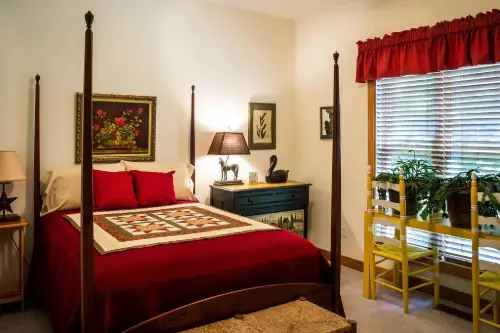1. Overloading the Guest Room with Decor

Trying to make the guest room cozy is great, but too much décor—like excessive pillows, quirky art, or scented diffusers—can make the space feel cluttered or impersonal. Some guests may have allergies, feel out of place, or struggle to find room for their own belongings. A “curated” look can sometimes feel more like a showroom than a restful retreat. It can be especially off-putting if it looks nicer than the rest of the home.
Instead, prioritize practicality over aesthetics. Leave space in drawers or a luggage rack, offer an extra phone charger, and provide simple lighting. Think of what you’d want in a hotel room—clean sheets, privacy, and room to breathe. Hospitality isn’t about styling; it’s about care.
2. Insisting Guests “Make Themselves at Home”

The sentiment is kind, but it can put guests in an awkward position. Most people won’t feel comfortable raiding your fridge or fiddling with your thermostat, no matter how many times you insist. Without clear boundaries or instructions, “make yourself at home” becomes a guessing game. Your guests might end up doing less than they want, just to avoid overstepping.
Instead, offer small, specific ways they can be comfortable. Say something like, “Feel free to grab drinks from this shelf” or “This drawer has all the extra towels.” These details offer guidance and permission, which makes people relax. The goal is comfort, not confusion.
3. Going Overboard With Cleaning Right Before They Arrive

Yes, a clean home is welcoming—but an overly pristine space can actually make guests feel uneasy. If it smells like bleach and looks like a model home, they may worry about messing things up. Some might even feel like they’re intruding on something too perfect. The pressure to “be careful” can ruin their sense of ease.
Instead, aim for tidy and clean, not sterile. Show signs of life—like a fruit bowl on the counter or a few books on the coffee table. These details remind guests this is a lived-in, welcoming space. Authenticity can be more comforting than perfection.
4. Cooking an Elaborate, Multi-Course Meal

Going all out in the kitchen sounds impressive, but it can backfire in a few ways. It keeps you stuck in the kitchen instead of spending time with your guests. It may also raise the bar for them to feel they have to reciprocate, which can create subtle tension. And honestly, many people feel more relaxed with a simple, unfussy meal.
Instead, prepare something that allows you to stay present and enjoy the moment. A make-ahead dish, a charcuterie spread, or ordering from a favorite local spot can work wonders. Your guests came to see you, not to critique your soufflé. Focus on connection over culinary showmanship.
5. Giving an In-Depth House Tour

Unless your guests are staying for a long time or your home is particularly unique, a full tour can feel awkward or unnecessary. Some might interpret it as showing off, while others may not retain all the info you’re rattling off. It’s often more about the host than the guest—and can make them feel like they’re being evaluated. Not to mention, they’re probably just wondering where the bathroom is.
Instead, stick to what they actually need to know. Point out the guest room, bathroom, where to grab snacks, and how to use the Wi-Fi. Keep it brief and practical so they feel oriented without being overwhelmed. The goal is to make them feel empowered, not impressed.
6. Leaving Welcome Baskets Full of Stuff They Won’t Use

The Pinterest-worthy gift basket filled with scented candles, monogrammed mugs, and decorative soaps might look charming—but it can miss the mark. Guests traveling light or by plane may not want to carry extra items home. Some might also have allergies or sensitivities, especially to fragrances. What’s meant as a sweet gesture can end up being unused clutter.
Instead, keep welcome touches functional and consumable. Think local snacks, a handwritten note, or a phone charger they can borrow. These details are more likely to be appreciated and used. Focus on hospitality, not novelty.
7. Refusing Any Help from Guests

It’s natural to want to be the perfect host and let guests relax, but refusing all offers of help can actually make people uncomfortable. Many guests feel more at ease when they can contribute, whether that’s clearing plates or helping prep breakfast. Constantly saying “No, I’ve got it!” can make them feel like they’re imposing. It’s the opposite of making them feel like part of the home.
Instead, accept small gestures they offer. Let them chop a vegetable or choose the music for dinner. It builds a sense of shared experience and takes the pressure off both sides. Hosting doesn’t have to be a solo act—it can be collaborative.
8. Talking Nonstop to Fill the Silence

Some hosts feel they need to keep the conversation flowing at all times to avoid awkwardness. But in reality, today’s guests often value a bit of quiet, especially after travel or during meals. Over-talking can come across as anxious or overwhelming. And it doesn’t always leave space for guests to express themselves.
Instead, embrace a few natural pauses in conversation. Ask open-ended questions and give guests time to respond. Sometimes the most memorable hosting moments come from just sitting together in comfortable silence. Presence matters more than performance.
9. Over-scheduling Every Minute of Their Stay

It might seem thoughtful to plan out every meal, attraction, and downtime activity, but guests today often crave flexibility. What used to be considered “gracious hosting” can now feel like pressure to perform or keep up. With people juggling burnout and constant busyness, even on vacation, most just want space to relax. A packed itinerary can leave them feeling more exhausted than when they arrived.
Instead, try suggesting one or two optional highlights per day and leave room for spontaneity. That way, guests don’t feel like they’re disappointing you if they want to skip an outing. You’re showing them the best of your city or home while giving them the autonomy to enjoy it at their own pace. Hosting should enhance their visit—not control it.
This post 9 Common Hosting Tips That Backfire With Today’s Guests was first published on Greenhouse Black.
